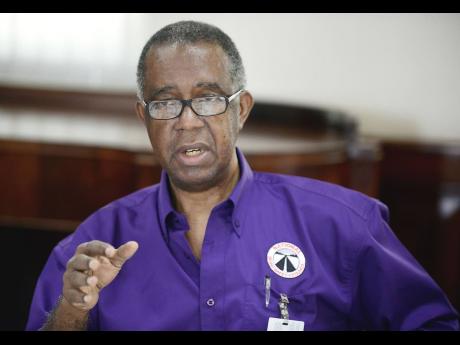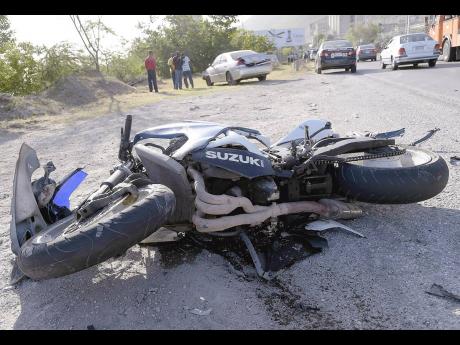Motorcyclists dominate road deaths
As another year draws to a close, motorcyclists continue to dominate road fatalities, with 129 of them killed in traffic crashes up to Tuesday, when the National Road Safety Council (NRSC) had recorded 415 persons killed to date, compared to the 480 for last year.
The number of motorcyclists killed then was 138. There was, however, a noticeable decline in the number of pedestrians, another vulnerable group of road users, with 74 killed to date, compared to 102 for the corresponding period last year.
Motorcyclists, pedestrians, and pedal cyclists account for two-thirds of the people killed in road crashes over the years.
For Dr Lucien Jones, vice-chairman of the NRSC, an important component of addressing the problem of road crashes is for Jamaica to adopt a comprehensive safety approach which involves safe roads, safe road users, and safe vehicles, which is complemented by an efficient crash-response system, whereby victims can be moved quickly, efficiently, and safely to a hospital, and where they can receive the requisite medical attention very soon thereafter.
Safe roads remain a major issue, according to Jones, and Jamaica needs to act on a recommendation of the World Health Organization (WHO) that each country should invite the International Road Assessment Programme (iRAP) to come in and assess its road network.
The iRAP is a registered charity dedicated to saving lives by eliminating high-risk roads throughout the world. It uses a robust, evidence-based approach to prevent unnecessary deaths and suffering. iRAP works in partnership with governments, road authorities, mobility clubs, development banks, NGOs, and research organisations to:
• Inspect high-risk roads and develop star ratings, risk maps and safer roads investment plans.
• Provide training, technology, and support that will build and sustain national, regional, and local capability
• Track road-safety performance so that funding agencies can assess the benefits of their investments.
Following its assessment, the iRAP will make recommendations on what the country needs to do to bring its road network to at least a three-star rating (the system runs from one star to five stars), which is in line with the WHO recommendation for safe roads.
“They will tell you how much it will cost to improve your road network to a three-star quality, and then it’s up to the Government to spend the money,” Jones explained. “At the same time, if you are building roads, you have to make sure that there is a road-safety component to it as recommended by the World Bank. When they lend you money, at least 10 per cent of the money has to go towards the safety component of the road.”
When asked if that is a requisite for other roads such as the Southern Coastal Highway Improvement Project, which runs from Harbour View in St Andrew through the parish of St Thomas to Port Antonio in Portland, Jones admitted his ignorance on the matter.
“I don’t know,” he declared. “One of the things that we have not been successful in doing is to ensure that we do audits before the road is built and to continue to do audits as the road is built. We (NRSC) don’t have the capacity to do it, so we depend on NWA (National Works Agency) to do that, and I’m not sure how well they have been doing in that respect.”
However, following on the establishment of safe roads, there must be follow-up in terms of enforcement by the officers of the Public Safety and Traffic Enforcement Branch (PSTEB) of the Jamaica Constabulary Force (JCF), Jones added.
“You then have to look critically at how well the police are effecting their stewardship. You have to look at the ticketing system. It is going to improve because it was in the news recently where Dr [Horace] Chang gave the police the full complement of what they need to write tickets electronically.”
The NRSC vice-chair also expressed optimism that the system would be significantly improved by further enhancement of the electronic system with the integration of cameras at traffic lights that are designed to automatically generate tickets when motorists breach the red light and other such offences.
“That’s to come on stream by the first quarter of next year, all things being equal. I gather there are some legal hurdles to overcome, so they are working on that now, but as far as I know, as far as I expect, those cameras should be onboard by the first quarter of 2024, and that will make a big difference.”


